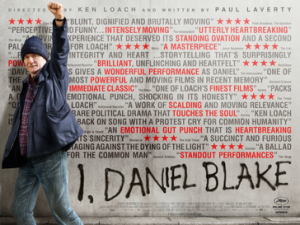film review: i, daniel blake

Sometimes films can take you by surprise: you think you know what you’re in for, but in the safety of the cinema they knock you out of your comfort zone and leave you reeling. For me, I, Daniel Blake was one of those films. While I expected a story of struggle, I certainly didn’t prepare myself for the devastating nature of this simple yet powerful film.
The film opens with a conversation between Daniel (Dave Johns), a carpenter by trade in his fifties, and a government endorsed “health professional” who is assessing his eligibility for a welfare payment for people unable to work due to sickness. The exchange sets the tone for the rest of the film, as Daniel is frustrated by a system that seemingly defies logic in order to work against him. He is denied the sickness benefit, despite the fact that his doctors have advised him he is unfit due to his recent heart attack.
Daniel then embarks on a drawn-out battle with the state as he tries to appeal the decision. In the local welfare office he meets Katie (Hayley Squires), a single mother of two who has just moved her family to Newcastle after two years in a homeless hostel in London. Daniel becomes a support system for Katie and her kids, and they in turn grow to love and care for him as they all face the injustices of contemporary society.
This is a film of few frills: set against the grey backdrop of Newcastle upon Tyne, scenes simply fade to black, and there are only a few songs to provide the occasional soundtrack. At times it feels more like a documentary, not only because of these aesthetic choices, but also because of the gut-wrenching believability of the narrative.
The film tells a powerful story, and it is absolutely a critique of the contemporary British welfare state. Director Ken Loach is known for his explicitly political approach to filmmaking, and this film is no different. It paints a picture of a system designed to discourage citizens from seeking support from the government, by punishing and alienating them at every step of the process.
Yet while much of the film is heartbreaking and sobering, it is not a solely depressing experience. The beautiful relationship between Daniel, Katie, and her children offers hope, and the support they give each other reminds the audience of the kindness in humanity. When Daniel takes a stand at the welfare office, there is a moment of empowerment, if brief.
The film’s message is bolstered by the brilliant performances of its lead actors. There is a particularly heartbreaking scene where Katie is collecting supplies from the foodbank, for which both Johns and Squires should be commended. Katie’s children Dylan (Dylan McKiernan) and Daisy (Briana Shann) are also wonderful throughout, and Shann as Daisy is especially brilliant in a scene where she visits Daniel and asks him to let her family support him just as he has done for them.
Whil its central protaganist is a white male character, I, Daniel Blake does a good job of portraying a variety of experiences of contemporary Britian. The character of Katie ensures a female perspective is represented, particularly one of a single mother. Daniel’s neighbour China (Kema Sikazwe) provides another perspective. China sells sneakers via underground trade, in which Daniel doesn’t get involved, but the two seemingly have a shared understanding of the unjust society in which they live.
Importantly, the film treats its central characters with the respect they are not afforded by the system supposed to be helping them. Toward the end of the film, Katie takes on sex work after her daughter is bullied at school when her only pair of shoes fall apart. Daniel is stricken at her decision, but the film doesn’t make any moral judgments. It is less kind to the government employees, who are mostly painted as cruel – though there is one character, Ann (Kate Rutter), who is clearly distressed by what she is expected to do. Perhaps this casting of these workers as villains was necessary to get the film’s point across, but it is surely true that in reality those employees are just as powerless to change the system as the welfare recipients themselves.
While the film tells a specifically British story, it is hard to ignore its relevance to an Australian context. In recent years, we have seen politicians employ language like ‘lifters’ and ‘leaners’ when talking about welfare, placing blame on the individual and obscuring the entrenched disadvantage that a welfare system should be designed to overcome. Cuts to welfare by both sides of politics further reinforce the idea that there is something wrong with needing a safety net. Sadly, it is all too easy to imagine the very story in this film playing out in Australia.
I, Daniel Blake is an important, eye-opening film. Its very blatant agenda might be off-putting for some viewers, but it is hard to deny the emotional power of its narrative. At the very least, it is a film that will leave you with plenty to think about.

